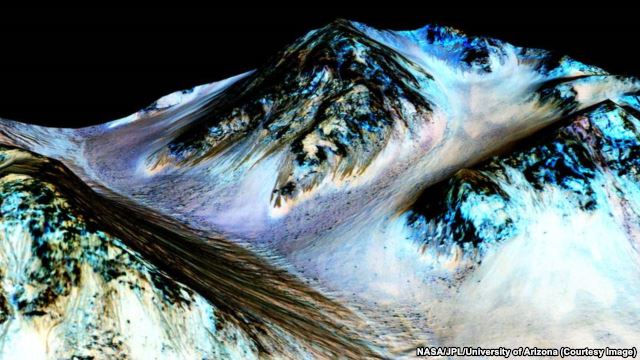NASA claims to have found evidence of liquid water on Mars. If true, you’d expect the US government to scramble to set up a new mission to test the claim. After all, discovering that Mars has life or even that in can support life will be one of the greatest discoveries ever.
“Today, we’re revolutionizing our understanding of the planet,” said Jim Green, director of planetary science at NASA Headquarters in Washington, during a press conference Monday. “Mars is not the dry, arid planet that we thought of in the past - under certain circumstances, liquid water has been found on Mars.”
NASA has found lines of "hydrated" salt minerals on Mars. Scientists say these minerals would require liquid water to be created. And where there’s liquid water, they say, there could be life.
NASA has found evidence of water on Mars in the past. In March, NASA said there was once more water on Mars than in Earth's Arctic Ocean.
They say more than four billion years ago, Mars was covered with water 137 meters deep. But nearly all of it has since evaporated into space.
Speculation has been mounting that NASA’s announcement would involve flowing water. Scientists have long known that there is frozen water at Mars' poles, but they have never discovered liquid water.
The discovery could have huge consequences for future expeditions, including NASA's goal of sending a manned mission to Mars by the 2030s.
NASA’s hype around the discovery of liquid water on Mars can be explained by its constant need to increase funding for its work. And that attention seems to be helping.
But it won’t be eager to tell you that its human mission, currently planned for 2030, will inevitably contaminate Mars with microbes, and break the rules of an international treaty.
Now, the Mars orbiter has gathered spectroscopic data from these dark streaks that shows the presence of briny water containing the salts magnesium perchlorate, magnesium chlorate and sodium perchlorate.
The researchers said that microbial life forms on Earth can live in such briny solutions whenever they appear on Earth, such as in the dry Atacama Desert of Chile.
Joe Michalski, a Mars researcher at the Natural History Museum in London, who was not involved in the research, said: "These results provide strong evidence that salty water occasionally flows on the Martian surface.
We know from the study of extremophiles on Earth that life can not only survive, but thrive in conditions that are hyperarid, very saline or otherwise 'extreme' in comparison to what is habitable to a human
“Today, we’re revolutionizing our understanding of the planet,” said Jim Green, director of planetary science at NASA Headquarters in Washington, during a press conference Monday. “Mars is not the dry, arid planet that we thought of in the past - under certain circumstances, liquid water has been found on Mars.”
NASA has found lines of "hydrated" salt minerals on Mars. Scientists say these minerals would require liquid water to be created. And where there’s liquid water, they say, there could be life.
NASA has found evidence of water on Mars in the past. In March, NASA said there was once more water on Mars than in Earth's Arctic Ocean.
They say more than four billion years ago, Mars was covered with water 137 meters deep. But nearly all of it has since evaporated into space.
Speculation has been mounting that NASA’s announcement would involve flowing water. Scientists have long known that there is frozen water at Mars' poles, but they have never discovered liquid water.
The discovery could have huge consequences for future expeditions, including NASA's goal of sending a manned mission to Mars by the 2030s.
NASA’s hype around the discovery of liquid water on Mars can be explained by its constant need to increase funding for its work. And that attention seems to be helping.
But it won’t be eager to tell you that its human mission, currently planned for 2030, will inevitably contaminate Mars with microbes, and break the rules of an international treaty.
Now, the Mars orbiter has gathered spectroscopic data from these dark streaks that shows the presence of briny water containing the salts magnesium perchlorate, magnesium chlorate and sodium perchlorate.
The researchers said that microbial life forms on Earth can live in such briny solutions whenever they appear on Earth, such as in the dry Atacama Desert of Chile.
We know from the study of extremophiles on Earth that life can not only survive, but thrive in conditions that are hyperarid, very saline or otherwise 'extreme' in comparison to what is habitable to a human

Comments
Post a Comment